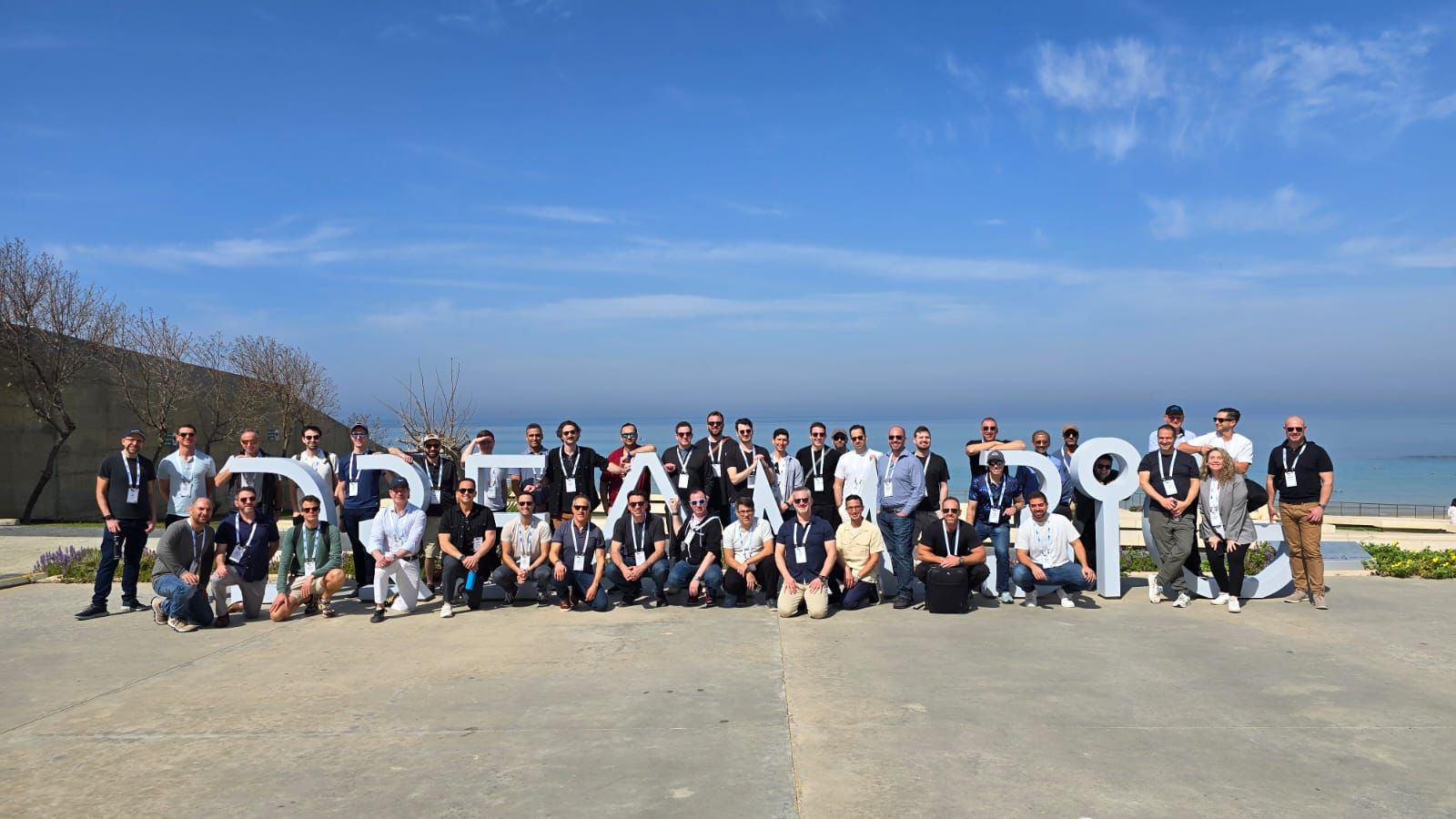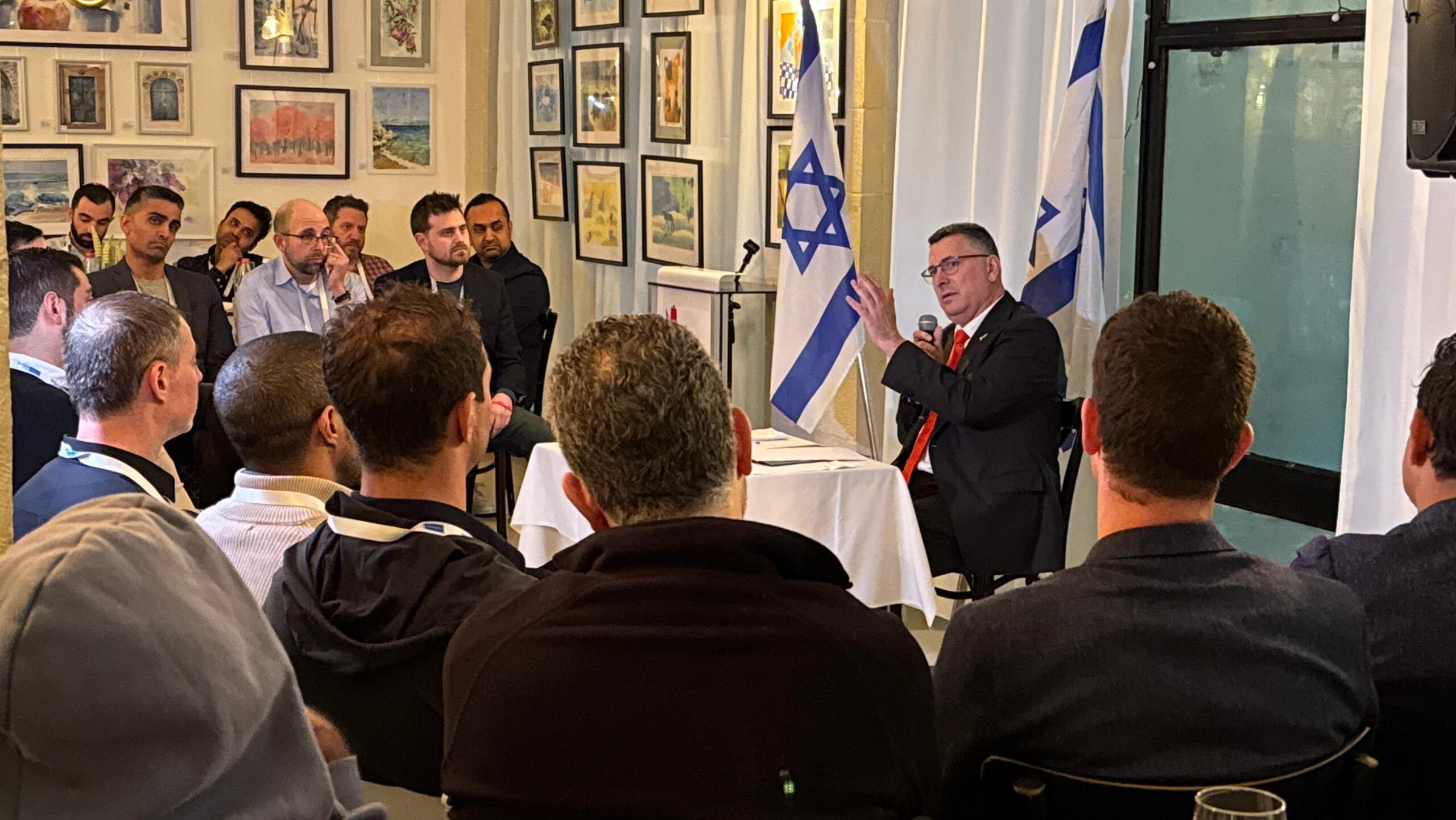Post-Exit Founders Eye New Ventures in Israel Amid Varied Economic Forecast
Amid reports of Israeli brain drain, 45 international founders—whose companies sold collectively for $5 billion—headed to Israel to explore the country’s bustling startup ecosystem, meet investors, and gain new perspectives on the region
This week brought news of an economic exodus from Israel, with Henley & Partners and New World Wealth reporting that 1,700 millionaires left Tel Aviv over the past year. Israeli analysts attributed the decline to the ongoing war and to the controversial judicial reforms, with many fearing that President Donald Trump’s tariffs will further constrain Israeli industry.
On the ground, though, things don’t seem as bleak as the report suggests. “There’s equal amounts of American tech executives and investors going to Israel right now as there are tech executives and investors leaving Israel right now,” David Nakar, executive director of Israel Tech Mission, told The Media Line, noting that concerns about a brain drain seem to be overblown.
Nakar is hard at work making sure those concerns don’t come to fruition. Last month, his organization brought 45 entrepreneurs who had successfully sold businesses on a trip to Israel organized with the Post-Exit Founders community. The participants spoke to key Israeli investors, visited Hostages Square and the historic sights of Jerusalem, and met with top leaders in Israeli government and industry.
In Israel’s Foreign Ministry building, around many tables set in the shape of a square, the group gathered for a meeting with Foreign Ministry Director General Eden Bar Tal to listen and share about the biggest problems facing Israel and its public image. The biggest takeaway from that discussion was the importance of the public-private partnership, Nakar said, noting the importance of “the government and private sector overlapping and working together to take on various issues that the private sector can’t handle by itself and the government sector can’t handle by itself.”

Participants in the Post-Exit Founders community tech mission to Israel at a meeting with Eden Bar Tal, director general of the Ministry of Foreign Affairs, March 2025. (Courtesy of Israel Ministry of Foreign Affairs)
There might be few parties better equipped to represent the private sector in such a discussion than the delegation of entrepreneurs, whose various companies sold for a combined $5 billion.
When you exit a company, it’s a surprisingly lonely feeling. And you’re not really going to call your high school friend and start complaining like, I made all this money and I don’t know what to do with my life.
“When you exit a company, it’s a surprisingly lonely feeling,” Barak Kaufman, who founded the Post-Exit Founders community, told The Media Line. “And you’re not really going to call your high school friend and start complaining like, I made all this money and I don’t know what to do with my life. I like to call it the world’s tiny violinist problem.”
That’s what inspired Kaufman, whose company Intello was acquired by SailPoint in 2021, to form the community of founders who’ve exited their companies. A group chat Kaufman opened with a dozen post-exit founders—to discuss questions ranging from taxes to finding one’s purpose—eventually grew into a group of 4,000 founders from around the world.
Kaufman, who now lives in Tel Aviv, developed the idea of bringing members from the Post-Exit Founders community to Israel in part to build connections between members based in the US and the 400 or so members of the Post-Exit Founders community based in Israel.
Shlomo Dalezman, who co-founded Intello together with Kaufman, said that the idea for the Israel mission grew out of a previous plan to bring post-exit founders to Saudi Arabia.
Dalezman explained that the Saudi head of equities met with the group and invited them to visit Saudi Arabia. The members were enthusiastic about such a trip, but only if Saudi Arabia was able to arrange visas for all the Israeli founders interested in attending.
When that didn’t happen, Dalezman said, “we said, screw it. We can’t bring the entire community to Saudi Arabia, we’re gonna bring them to Israel.”
The trip was organized through Israel Tech Mission, an organization that brings business leaders to Israel with the goal of increasing international investment in Israeli innovation. David Malton, a private equity principal involved with Israel Tech Mission, described the organization’s objective as bringing people to Israel “who can influence Israel, their tech sector, their economy, and in doing so, [helping] educate many people who only know Israel from what they read in the papers and see on the news.”
We wanted them to see that Tel Aviv is a thriving tech ecosystem and it’s not an active war zone, and to really change their opinion on Israel from a tech level.
Nakar said that the trip was meant to help connect the founders to Israel and showcase the country’s investment opportunities. “We wanted them to see that Tel Aviv is a thriving tech ecosystem and it’s not an active war zone, and to really change their opinion on Israel from a tech level,” he told The Media Line, noting that several of the participants were uninformed as to what took place during the attacks on October 7, 2023.
Give the gift of hope
We practice what we preach:
accurate, fearless journalism. But we can't do it alone.
- On the ground in Gaza, Syria, Israel, Egypt, Pakistan, and more
- Our program trained more than 100 journalists
- Calling out fake news and reporting real facts
- On the ground in Gaza, Syria, Israel, Egypt, Pakistan, and more
- Our program trained more than 100 journalists
- Calling out fake news and reporting real facts
Join us.
Support The Media Line. Save democracy.



Post-exit founders on the Israel Tech Mission trip pose in Tel Aviv, March 2025. (Courtesy of Israel Tech Mission)
According to Dalezman, about half of those who came on the trip had never been to Israel and one-third were not Jewish.
Their motivations for joining the trip were diverse. Sam Goldberg, co-founder of Lucidity Tech, was drawn to the trip by a desire to “show solidarity for the Israeli people and the tech community here.”
Goldberg, who now works as a professor at the University of Southern California law school, said he was disappointed by the lack of unity among the Jewish American community around antisemitism, especially on campus.
“There hasn’t been better preparation for students to be able to handle confrontation and, frankly, be proud of their Judaism. I think one of the great problems that we’re facing is people aren’t proud enough of who they are, but ultimately this is a challenge for all of humanity,” he told The Media Line. “It always starts with an issue with the antisemitism, but that’s just the canary in the coal mine, that we’re facing real social problems.”
Arunabh Dastidar, who co-founded the Leni AI real estate company, said he was looking to spend time with the “amazing group of people” in the Post-Exit Founders community and to get back to Israel, where he had spent time on a business school exchange.
One of Dastidar’s previous companies, Rockethomes, was among the first to provide same-day delivery for home improvement supplies.
Dastidar said that his view of Israel was shaped from his experiences having worked across many different regions in India—in 26 of India’s 29 states.
“The more people get to know what’s going on and get to know what’s behind the scenes, I think perspectives will evolve, because rationality takes precedence,” he told The Media Line.
David Gorodyansky, co-founder of the internet privacy company AnchorFree, was particularly interested in exploring the intersection of “politics and global affairs and technology” in Israel. Gorodyansky’s product took off in Egypt, Tunisia, and Libya during the Arab Spring, when millions of users started using it to circumvent state restrictions on internet access.
“I think we got to a point where a third of the population of the Middle East used our product,” Gorodyansky told The Media Line.
Many of the participants spoke about how meaningful it was to see a more nuanced picture of Israel than is often presented in the media.
“I was really thinking I’m coming to a war zone,” Sahin Boydas, the Austin-based founder of RemoteTeam, who is originally from Turkey, said of his mindset coming into the trip.
“We only hear the one side of the story and the negative side of the story. We never hear the stories from people from here,” Boydas, who has sold four companies in Turkey and two in the US, told The Media Line. “But now I see how amazing the people are. I’m very surprised. Like very, very surprised.”
Joshua Litwack, co-founder of Paragon Data Labs, described the importance of spending the trip together with non-Jewish founders. “I really made it my mission from day one being here to be vocal, have the conversations with them, facilitate dialogue, and really do anything I can to give that particularized knowledge,” he told The Media Line. “When you really think about it, the issue really isn’t that complex. There’s nuance, but with the right particularized knowledge, there’s a clear right and wrong.”
In many ways, the group of founders was remarkably diverse. One notable exception was that every one of the delegation’s attendees were men.
Kaufman said that dynamic reflected the broader reality of post-exit founders. Of the 4,000 founders in his community, only 3% are women.
“Despite all of our efforts, we have really not been able to make a dent in uncovering other female exited founders to be able to join,” Kaufman said. “I was worried about the self-selection bias that maybe if a bunch of white men or whoever it is are joining, that you’d know other white men and not other exited females. And I don’t think it’s the case.”
“It’s in Israel as well, where we have close to 400 Israeli exited founders here. And we have about three dozen female exited founders—maybe a little less. Maybe closer to 25,” he said.
Even before this trip, Kaufman has brought an Israel narrative to the Post-Exit Founders community through events with Israeli NBA player Omri Caspi and Israeli WNBA player Shai Doron. Especially since the October 7 attacks, he said, “it was hard not to use the platform to kind of make a difference.”
His goal, though, is to be “as apolitical as possible.” He said that the connection to Israel has less to do with politics and more to do with the fact that so many startup founders are themselves Israeli.
Israel actually plays a pretty big role within the high-tech exit ecosystem. And so it’s kind of this natural mixing of people that can kind of relate, no matter where they are in life or what their ethnicity is, just around their personal journey.
“Israel actually plays a pretty big role within the high-tech exit ecosystem,” Kaufman explained. “And so it’s kind of this natural mixing of people that can kind of relate, no matter where they are in life or what their ethnicity is, just around their personal journey.”
Jason Friedman, a partner at the Orange Collective venture fund, which invests in top high-tech companies around the world, told The Media Line that there’s room for Israeli startups to become even more influential.
“One of the things I would love to happen over the next decade of Israeli high tech is entrepreneurs build companies with the intention of being a top generational global company,” Friedman said. “And they do so knowing where they’re from, knowing where their strengths are, but choosing to use their access to Israeli capital and their access to phenomenal Israeli employees and build a company that’s global from the start.”
About 40% of Israel’s high-tech market is currently concentrated in cybersecurity, with a focus on “hard tech,” or technological solutions that involve hardware as well as software. Friedman said that Israel’s market is poised to diversify into such fields as consumer applications and AI development. “We don’t need to only be successful at hard tech. We should assume that our founders, with their resilience, their determination, their speed, their innovation, that they can succeed at literally any sector,” he said.
The obstacle is intention. Israel capital, Israel founders need to want to build global companies. And that’s a partnership with the rest of the world. We do amazing work when Israel is unified, focused on one thing. We will do better work when it’s a global effort.
“The obstacle is intention,” Friedman continued. “Israel capital, Israel founders need to want to build global companies. And that’s a partnership with the rest of the world. We do amazing work when Israel is unified, focused on one thing. We will do better work when it’s a global effort.”
Having returned from Israel, the post-exit founders are now doing what they do best: thinking up their next big move. The trip hasn’t yet resulted in investments or sales, but according to Nakar, some founders are currently in conversations with investors they met while in Israel. “Deal flow takes time,” he said.
For many of the founders, it seems, the next move may involve insights they gleaned from the trip, including a newfound connection to Israel. Friedman himself said that the trip has inspired him to start coming to Israel “two, three times a year for the rest of my life” after last having visited the country 20 years ago.
Speaking at the trip’s closing dinner, which was attended by Foreign Minister Gideon Sa’ar, one founder spoke about how the trip influenced his desire to sell his company and move on to something more mission driven.
“The set of people that we met on the trip finally provide a mechanism to be able to realize that intent into an actual purpose,” the founder said. “I don’t know what to do with it yet. But I know that over the next seven days, as I try to sell the [company], I will also spend more time thinking about what I can do with the rest of my life to help the cause.”

